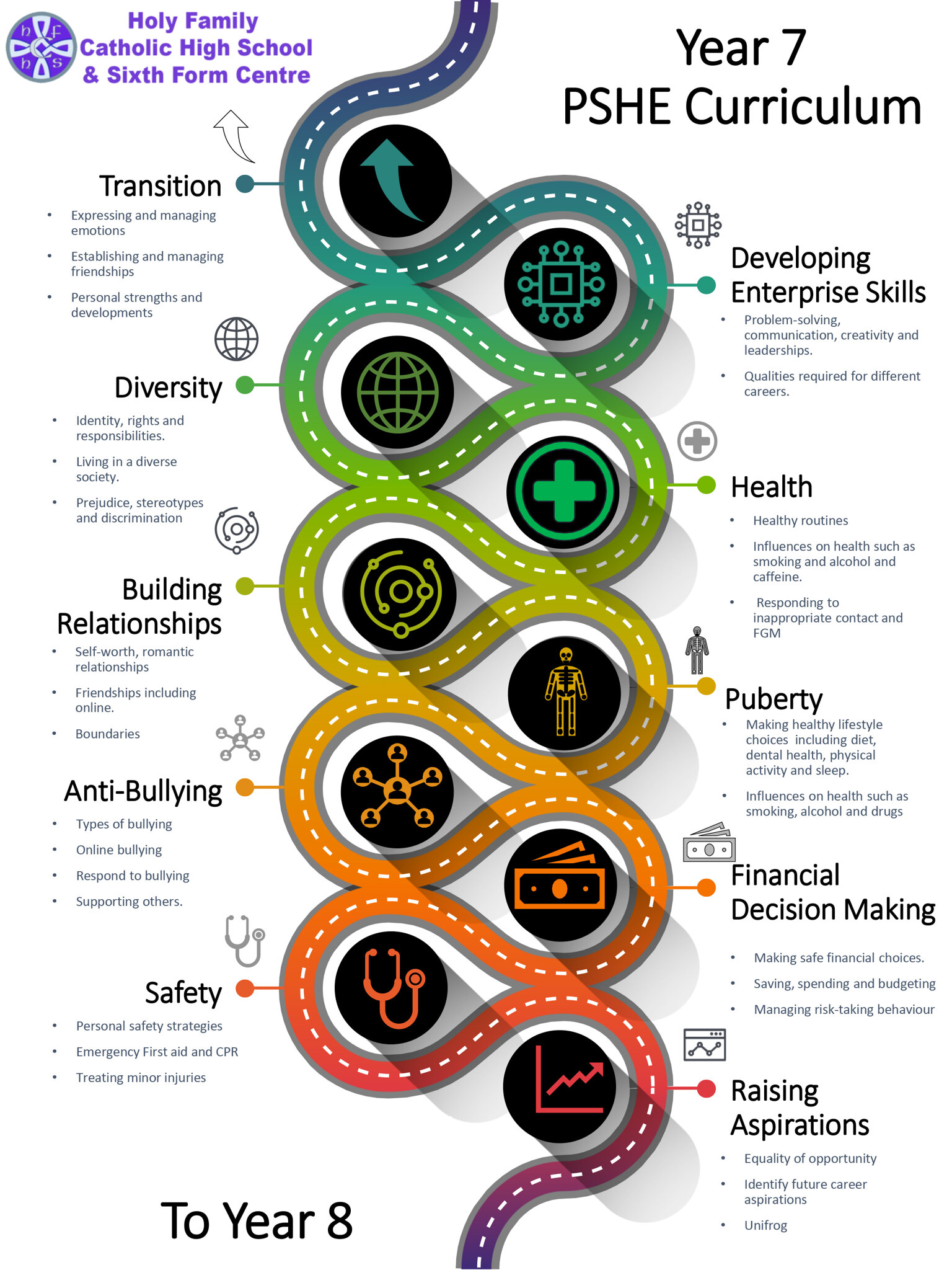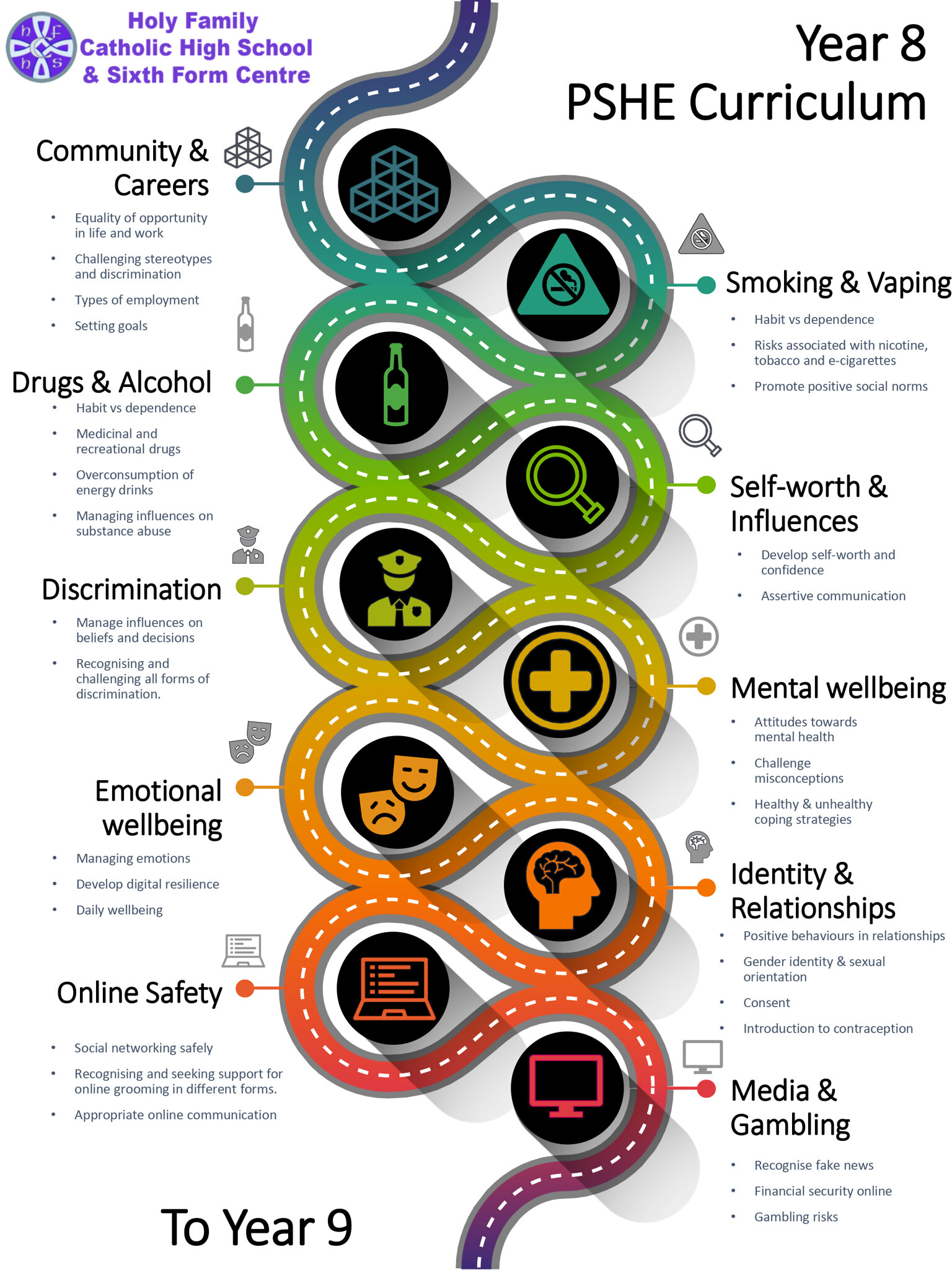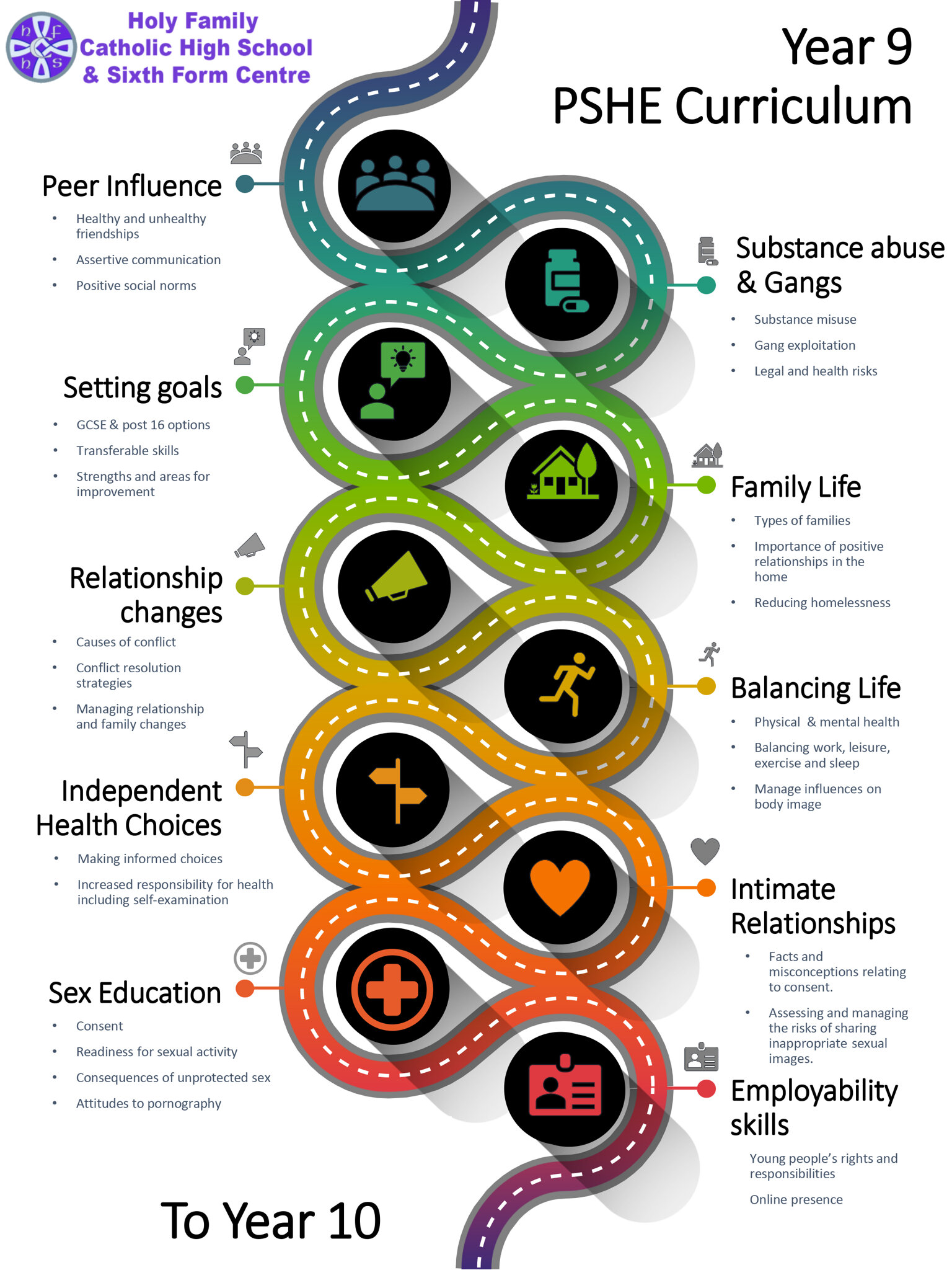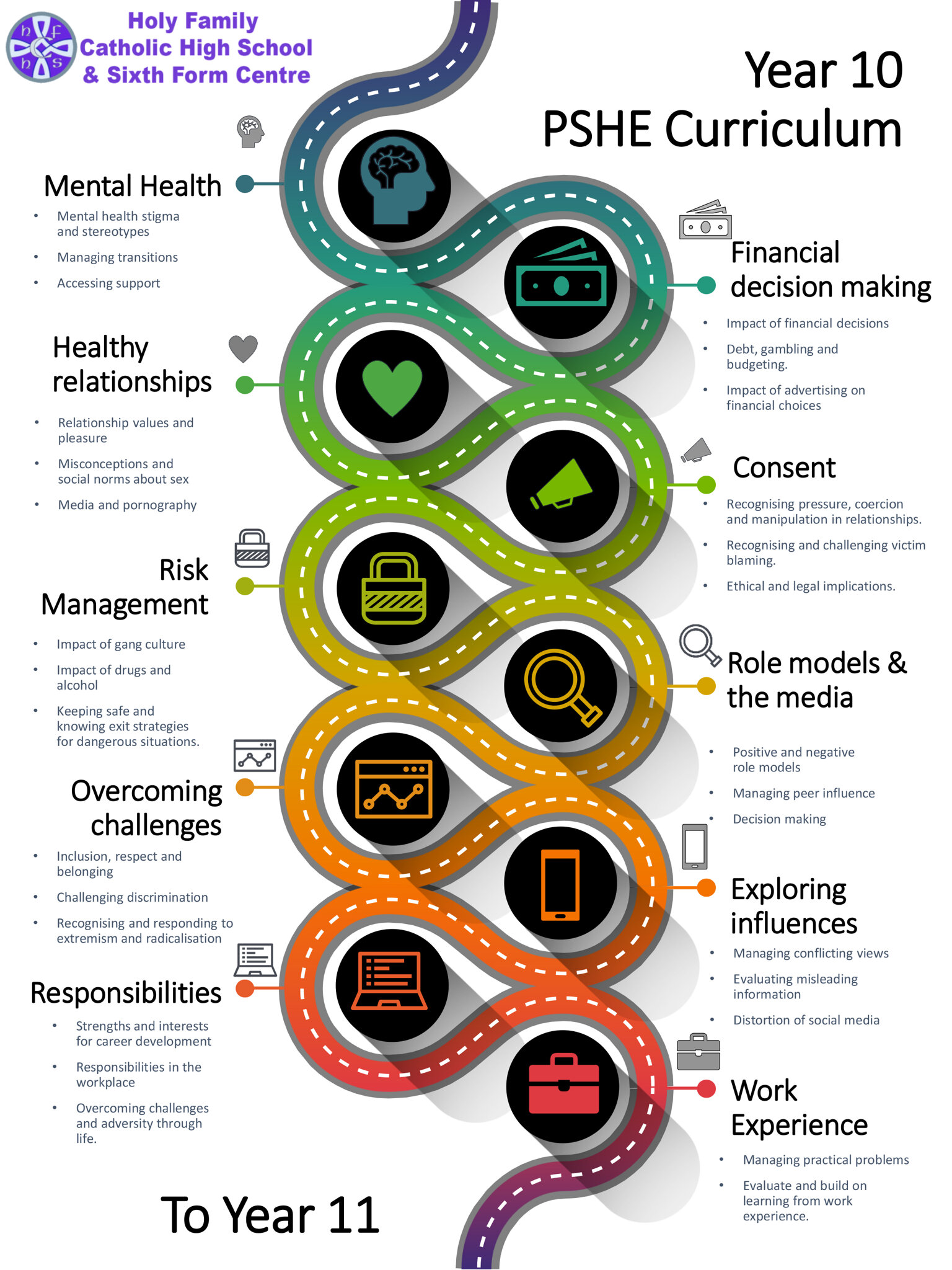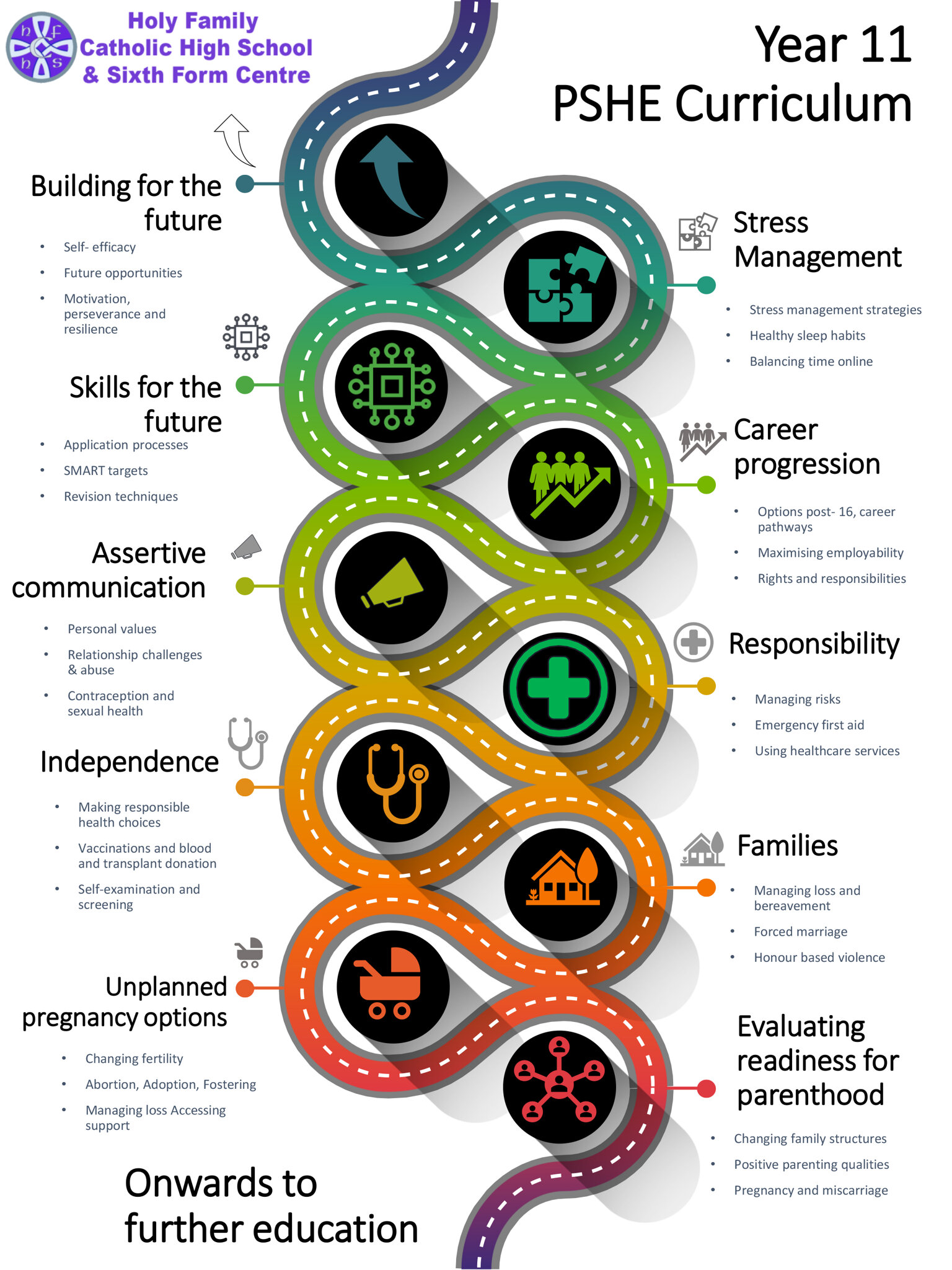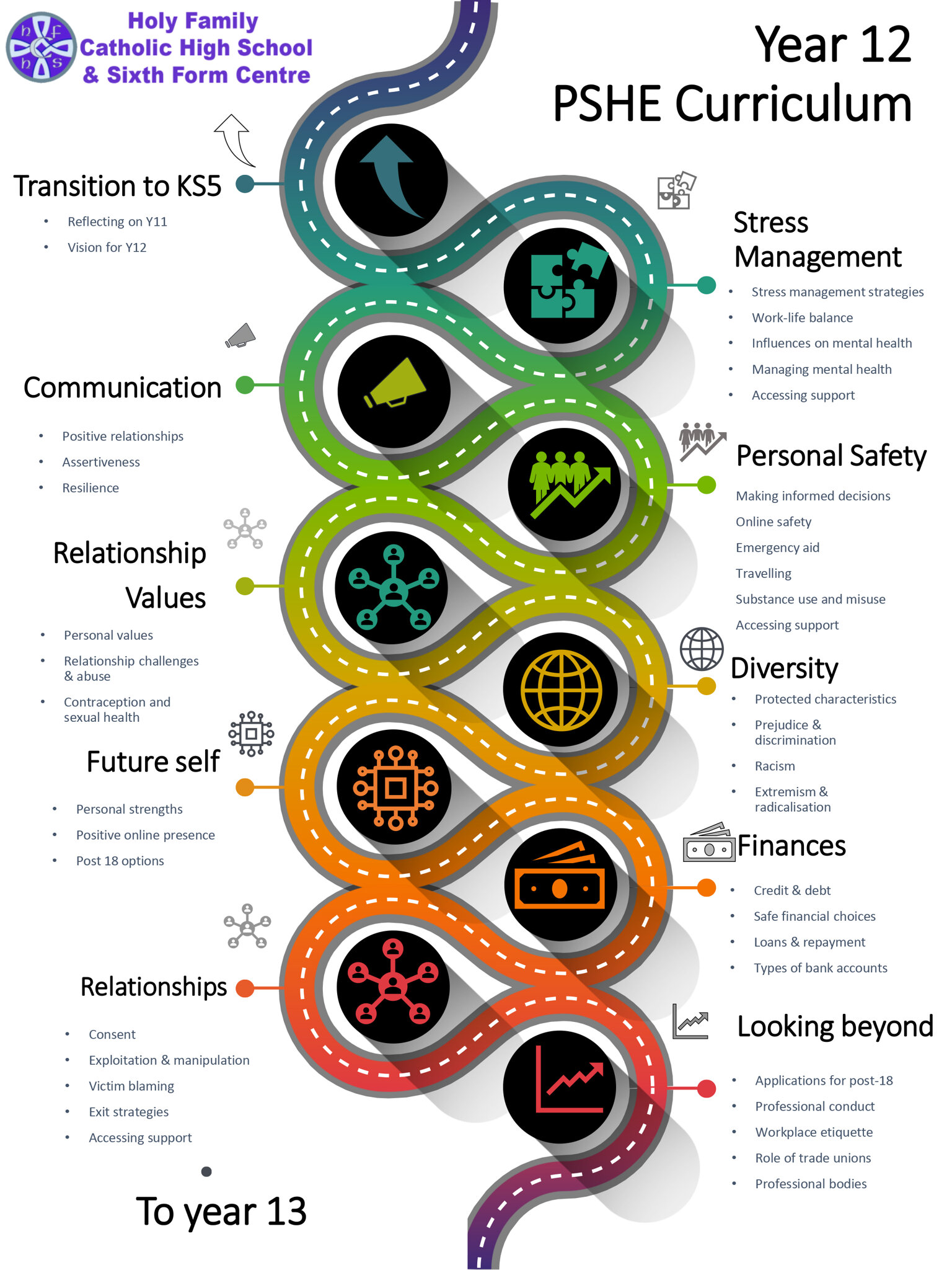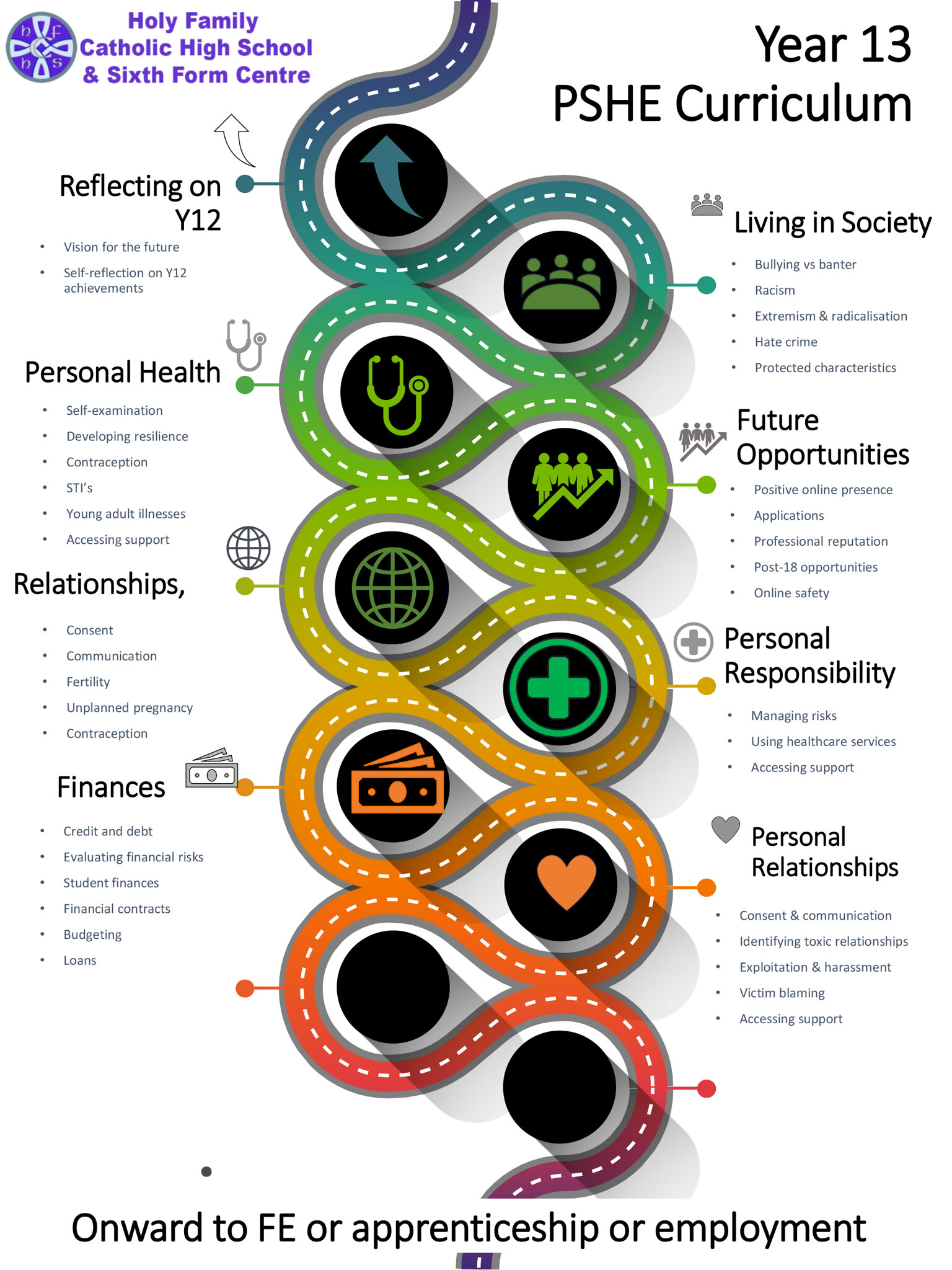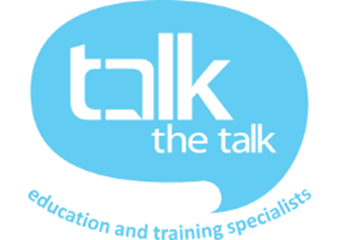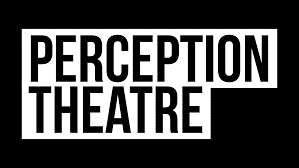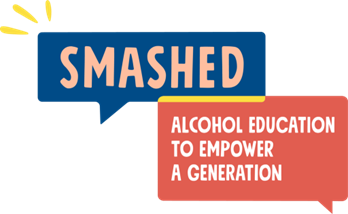PSHE/RSHE
Co - Heads of department KS3 & KS4 - Mrs N Kirby, Miss P Gardner & Mrs D Coyne
Head of department KS5 - Mrs D Coyne
PSHE INTENT
At Holy Family Catholic High School we aim to provide a well-structured and balanced PSHE programme, based on the core themes of Health and Wellbeing, Living in the Wider World and Relationships. The programme is designed to help learners develop the knowledge, understanding and skills they need to manage their lives, keep themselves healthy and safe, now and in the future.
We also feel it is important that our pupils leave school with an understanding of the social and moral awareness to thrive in society, as well as political, legal and economic functions of modern Britain. We focus on real life issues which affect our pupils, their families and their communities. At all times, our Catholic faith and ethos underpin the discussions and various sensitive topics, without hindering the delivery of content.
We aim to encourage high aspirations for all pupils in order to maximise progress and to enable all pupils to experience the joy of success. Evidence shows that well-delivered PSHE programmes have an impact on both academic and non-academic outcomes for pupils, particularly the most vulnerable and disadvantaged.’ (PSHE Association 2019)
Our intent is to provide a stimulating and engaging PSHE curriculum that provides opportunities for pupils to reflect on and clarify their own values and attitudes as they develop into mature young people.
PSHE aims to help pupils to:
• Identify their personal qualities, attitudes, skills, attributes and achievements and what influences these.
• Explore their attitudes, values and beliefs and develop the skills, language and strategies needed to manage any issues should they encounter in their lives.
• Apply academic skills such as critical thinking, literacy and resilience.
• Promote pupils’ spiritual, moral, social and cultural development.
• Equip all pupils with the knowledge and skills they need to stay safe and be able to communicate when they do not feel safe, as well as knowing where to find support.
PSHE promotes personal and SMSC development by helping pupils to build their confidence, resilience and self-esteem, and to identify and manage risk, make informed choices and understand what influences their decisions. It provokes challenging questions about health and wellbeing, relationships and living in the wider world.
Programmes of study for PSHE have a clear plan for what pupils should know and be able to do in PSHE by the end of each Key Stage. This is explicit in planning and there is a shared understanding across all those who teach PSHE. The PSHE programme supports the pupils to thrive in a time of rapid change, with new and unpredictable opportunities and challenges constantly emerging. It takes the ‘learning opportunities’ outlined within the three core themes and helps develop the pupils’ concepts, skills and attributes and engage in respectful discussions about these issues.
PSHE provides clear for the pupils to learn in order to be successful in the world of work, in relationships forged throughout life and as a valued contributor to society as a whole. These tools consist of knowledge gained, behaviours learned and skills mastered and it is our job to ensure that all learners have the opportunity to develop these attributes through their high-quality school experience.
PSHE IMPLEMENTATION
Our curriculum model is as follows:
We allocate 6 lessons per half term for bespoke PSHE lessons, across the whole school. There is a 1-hour lesson timetabled during week B and another rolling lesson occurs during week A. We strive to ensure a stable curriculum is implemented across the school. Each half term, staff are allocated to year groups and specific lessons according to their areas of expertise, based on the three themes of Living in the Wider World, Relationships and Healthy Living. For example, we have developed a strong team of specialist staff who teach the ‘Relationships’ lessons across Y7-Y11. This team has been trained by an external agency due to the sensitive nature of the lesson content and has supported the staff in the development of suitable activities.
All staff are involved in delivering the programme of lessons. At the start of each half term, staff are divided into their teams and are provided with some carefully selected, age appropriate resources, to use as a basis to plan their lessons. Staff are then provided with time to plan their lesson and deliver this lesson on the rota, to different form groups. This model ensures that pupils across the school receive a rich and varied diet of different learning opportunities, as well as developing relationships with staff whom they might not otherwise get to know.
At Key Stage 3, curriculum planning and delivery is in line with the PSHE Association guidelines and builds on the skills, attitudes, values, knowledge and understanding they have acquired during the primary phase.
The Key Stage 4 curriculum deepens knowledge and understanding acquired during Key Stage 3. KS5 programme further develops the skills and knowledge acquired at KS3 and KS4.
The leadership team of the PSHE programme has established strong links with the professional association for PSHE and access all the subject specific support, training opportunities and up to date guidance. There is also bespoke support from the Archdiocese and we have good network connections with other catholic schools in the local area.
Across all Key Stages the high quality of teaching and learning in PSHE creates a positive environment which is safe, interesting and excites pupils to be inquisitive, ask questions and listen to others. The curriculum is engaging and varied using case studies, data and research that is relevant to our pupils and our school setting.
We have developed the programme across all key stages to have at its heart, the statutory Relationships, Sex and Health Education (RSHE. This ensures that the pupils are very well-equipped for the next stage of their education or employment. We have a fully trained team of specialist staff who deliver the relevant topics across all year groups.
Opportunities to promote British Values, protected characteristics and LGBTQAI+ are signposted throughout the programme, which dovetails with activities that are undertaken during form time, in assemblies and across the wider school during extra-curricular activities and enrichment opportunities.
A wide range of teaching and learning activities can be regularly observed during PSHE lessons. They are supported by a variety of local and national case studies, up-to date newspaper articles, reading activities that are embedded in PSHE lessons. Teachers make excellent use of mini-whiteboards and extended mind maps in the booklets, to check understanding at the beginning, during and at the end of the lessons. This then helps decide whether to progress a theme or revisit certain aspects. Questioning is a key tool used throughout the lessons and pupils feel safe and valued when answering and discussing in class. Pupils are actively encouraged to debate, discuss and ask relevant questions. The clear setting of ground rules at the start of lessons allows the pupils to know they are in a safe space and can explore their feelings and articulate their personal views without fear of repercussion. They are actively encouraged to express personal opinions and respect others.
Pupil progress during the lessons is demonstrated on a one-page summary, where there will be a baseline activity or question at the start, then pupils enhance their work during or at the end of the lesson. There are retrieval activities to allow pupils to link their new learning to prior knowledge. There is also a scenario- based assessment at the end of each topic, to allow pupils to independently self-assess their knowledge and skills. Senior Leaders and Progress Leaders ‘test the temperature’ of all PSHE lessons when they are in progress and pupil voice is gathered on a regular basis, to help evaluate the success of the activities and the impact that has been made on pupil learning and skills acquired.
Parents are kept informed of the content that is being covered in lessons via online announcements and the school website.
Enrichment
We welcome a variety of visiting speakers and productions during the year, to provide an additional dimension to pupil learning.
|
TALK THE TALK have supported our specialist staff relationships team and have also delivered workshops to Year 9 about Consent, readiness for intimacy and self-examination
The CALL IT OUT programme for Years 10-13, delivers a powerful message to males about how to identify misogynistic behaviour among their peers and developing appropriate communication skills to ‘call out’ your peers should they be involved in disrespecting females.
https://www.facebook.com/TalkTheTalkEducationCIC/
|
|
PERCEPTION THEATRE for all year groups. CUT is an applied theatre production centred around knife crime and youth violence. It explores how a needless dispute at school causes a teenager to be stabbed and killed. Cut explores:
The target audience for the project is:
CUT aims to:
https://www.perceptiontheatre.com/cut
|
|
SMASHED (Year 8) is a powerful and realistic story of young people and alcohol. Learners stop and ask, ‘What if that was me?’ Students observe, explore and reflect on vital underage drinking themes including:
https://www.smashedproject.org/
|
|
To raise awareness of testicular cancer for Y10 – Y13, ambassadors from the ODDBALLS FOUNDATION visit schools, universities and workplaces, delivering talks on Testicular Cancer; reminding boys and men to check their testicles – and removing any stigma and embarrassment about it!
https://theoddballsfoundation.com/
|
|
COPPAFEEL (Y10-Y13) is the first breast cancer charity in the UK to solely create awareness amongst young people, with the aim of instilling the knowledge and tools they need to get to know their bodies. We like to talk about a serious message in a light-hearted way, empowering people to start healthy habits for life. The aims of CoppaFeel are to ensure all breast cancers are diagnosed early and correctly by… Encouraging you to check your boobs and pecs regularly from a young age. Educating you on the signs and symptoms of breast cancer. Empowering you to seek advice from a doctor if symptoms persist.
|
Resources
PSHE enables all pupils to become more confident and resilient young people, equipped to make safe and appropriate decisions regarding lifestyle choices.
Below are some links to resources to support the main themes covered during the PSHE programme.
